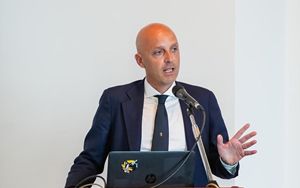(Finance) – “The new Business Crisis and Insolvency Code shifts attention to a phase prior to the onset of the crisis. There are numerous tools to be able to intervene, restructure companies and start again in a new economic perspective. The accountant, as a business manager, “chews” more than all the numbers and fiscal situations of companies: we will try to demonstrate that a crisis faced with conscience and competence can turn out to be an opportunity”. Matteo De Lise, president of Aiecc (Italian Association of crisis composition experts) as part of the conference “The New Code of Crisis and Insolvency: state of the art and revision proposals”, which took place in Naples, explaining that “we also need a new approach that can be constructive, identifying business lines through the tools provided for by the Code”.
Elbano de Nuccio, president of the National Council of Chartered Accountants, highlighted: “The objective is to maintain an economic system that is going through a turbulent moment. We are coming out of a pandemic, we are living with two international wars, inflation is growing and the market is unstable. The company needs strategic support, and it is a support that can only be provided by accountants, who know the dynamics of companies better than others, guaranteeing their continuity in the long term”.
For Eraldo Turi, number one of Odcec Napoli, “the new Code is a tool you can count on, but time is needed for all institutes to be able to exploit it in the best possible way. Today the interest of companies is to have financial availability to make investments: availability which at the moment is small, due to a particularly unstable international scenario. It’s a vicious cycle, with skyrocketing interest rates causing a radical decline in investment spending.”
Second Elisabetta Garzo, president of the Court of Naples, “the new Code imposes problems but also provides tools for the solution of difficult situations that entrepreneurs find themselves experiencing. The figure of the chartered accountant is very important, especially the commitment and great professionalism that we can find on a daily basis in the courtrooms”.
“The Code is an instrument still in the testing phase. The numbers we find in our judicial activity are not consistent with the legislator’s expectations, so much so that there is already talk of new corrective interventions. I believe a moment of reflection is necessary on the method used for this reform, I think that the path to follow is that of simplification in order to create general system coordinates in which the professional’s activity can be framed in a more adequate and successful way”, he remarked Gianpiero Scoppapresident of the Section of the Court of Naples.
Livia De Gennaro, delegated judge of the Court of Naples, argued: “The conference was a broad discussion between legal professionals from different courts: an opportunity to address increasingly problematic topics and in view of a corrective to the Code which will arrive in a few months. The request is for a professional who is increasingly specialized and familiar with business issues, who deals with regulatory developments in the interest of business continuity, which has become a central value”.
